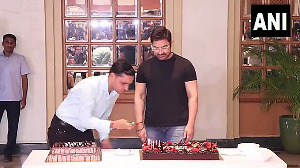Proxy voting, introduced for the armed forces, had no takers and thousands of government employees engaged by the Election Commission to conduct polls in Rajasthan, Chhattisgarh, Madhya Pradesh, Delhi and Mizoram did not vote.
"Proxy voting has practically not started. Nobody exercised it this time," an EC official told rediff.com on Tuesday.
Proxy voting, which came into effect in October, means voting through someone else. The returning officers of the concerned constituency writes to all eligible voters in this category, giving them an option to either vote by postal ballot or chose proxy voting.
In the first case, the ballot paper is sent to the voter after the nomination for the election is over. The person is expected to return the ballot paper after casting the vote.
In the proxy voting system, the voter is required to nominate a person who is above 18 years of age to vote on his or her behalf. The signature of the person is then attested by the returning officer. There is a provision of revoking the name of the nominated person whenever the voter wishes.
The EC official said not many people in this category were eligible to vote this time. But he could not explain the presence of large number of people from Rajasthan in the armed forces.
"It will take some time to become popular. May be in the Lok Sabha elections," he said.
Some of the government officials who conducted the polls in Delhi told rediff.com that they found the process of voting very cumbersome, and time constraints were also there.
Chandra Lal, a defence ministry employee who was presiding officer at a polling station in Kasturba Nagar, south Delhi, was one such person. He has not voted since 1977, the year he started conducting elections.
These officials are sent to far away places on election duty but have the facility of postal ballot voting.
Lal said: "I reached the polling station at 5:00 am and have to be here till the polling ends. I am so busy throughout the day. I don't have time to vote."
These officials are given ballot papers when they get their election duty certificates before the polling day. They have to get it signed by the electoral officer where they are on duty. They are expected to cast their vote and send the ballot papers to the returning officer of their constituency.
It can be sent by post or hand-delivered.
Said Lal: "The process takes a lot of time. It has to be signed by three officers. Then the postal system in our country is not so quick. It takes at least a week for a letter to reach its destination. Our casting of vote would be useless because we know it will not reach there by time."
But the EC official said. "They are not aware of the law. We teach them during the training session but they don't listen. It can be hand-delivered also.
"How much time it takes to go to your own neighbourhood in a place like Delhi? But they are not interested."






 © 2025
© 2025